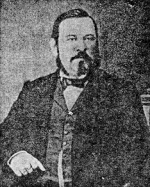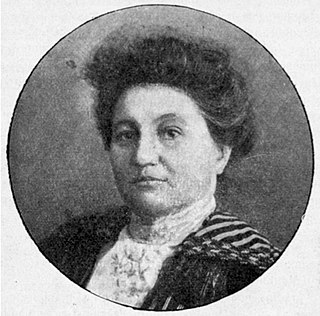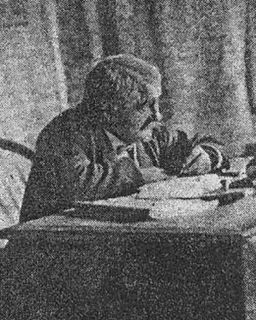 W
WConstantin D. Aricescu was a Wallachian, later Romanian poet, prose writer, playwright and revolutionary.
 W
WIoan Alecu Bassarabescu was a Romanian comedic writer, civil servant and politician, who served one term (1926–1927) in the Senate of Romania. His work, mainly in prose form, is remembered as an accomplished and noteworthy contribution to Romanian literature, capturing the dreary life of provincial clerks in the early 20th century. Not interested in producing a singular novel, like his mentor Gustave Flaubert, he concentrated instead on the sketch story genre.
 W
WTraian Rafael Radu Demetrescu was a Romanian poet, novelist and literary critic, considered one of the first symbolist authors in local literature. Influenced by French writers such as François Coppée and the Decadent Maurice Rollinat, as well as by the local poet Mihai Eminescu, he was made popular by his poems, many of which served as the basis of popular romanzas. Receptive to impressionism and naturalism, he wrote a number of psychological novels and several short stories, some of which are remembered for their melancholic and occasionally macabre themes.
 W
WPauline Elisabeth Ottilie Luise of Wied was the Queen of Romania as the wife of King Carol I, widely known by her literary name of Carmen Sylva.
 W
WNicolae Filimon was a Wallachian Romanian novelist and short-story writer, remembered as the author of the first Realist novel in Romanian literature, Ciocoii vechi şi noi, which was centered on the self-seeking figure Dinu Păturică. He was also a noted travel writer, folklorist, musician, and the first musical critic in his country.
 W
WBonifaciu Florescu was a Romanian polygraph, the illegitimate son of writer-revolutionary Nicolae Bălcescu. Born secretly outside his parents' native Wallachia, at Pest, he was taken by his aristocratic mother in France, growing up as an erudite Francophone and Francophile. Florescu graduated from the Lycée Louis-le-Grand and the University of Rennes, returning home at age 25 to become a successful lecturer, polemicist, and historian of culture. Influenced by his father's politics, he was for a while a prominent figure on the far-left of Romanian liberalism and nationalism, which pitted him against the conservative society Junimea, and against his own conservative cousin, Prime Minister Ion Emanuel Florescu. The conflict led to his losing a professorship at Iași University and being sidelined when applying for chairs at the University of Bucharest. His critique of Junimist literature, structured around a classical defense of prosody, inspired a libel by Mihai Eminescu—famously depicting Florescu as a "homunculus".
 W
WPantazi Ghica was a Wallachian, later Romanian politician and lawyer, also known as a dramatist, poet, short story writer, and literary critic. A prominent representative of the liberal current, he was the younger brother and lifelong collaborator of Ion Ghica, who served as Prime Minister of the Romanian Kingdom in 1866-1867 and again in 1870-1871. Pantazi Ghica began his political career as a participant in the Wallachian Revolution of 1848, a collaborator of the Romantic historian and activist Nicolae Bălcescu, and a member of the radical grouping headed by C. A. Rosetti. Although twice involved in the administration of Buzău County, Ghica lived much of his life in exile or in Bucharest, and was also a soldier for the Ottoman Empire during the Crimean War. After 1875, he was a prominent member of the National Liberal Party.
 W
WGrigore Haralamb Grandea was a Wallachian, later Romanian journalist, poet and prose writer.
 W
WConstanța Hodoș was an Imperial Austrian-born Romanian novelist, playwright and opinion journalist.
 W
WConstantin Al. Ionescu-Caion was a Romanian journalist and poet, primarily remembered for his legal dispute with humorist Ion Luca Caragiale. He was a Symbolist, a disciple of Alexandru Macedonski, and a militant Francophile, as well as a leading opponent of literary tradition. His scattered work comprises essays, short stories and prose poetry, noted for their cultural references, but made little impact on Romanian literature. As a journalist, Caion prioritized scandals, accusing Caragiale of plagiarism and losing the subsequent celebrity trial of 1902, before partly recanting and winning the retrial. Despite his own coquetries with Romanian nationalism, Caion focused his verve on Transylvania's contemporary nationalist literary current.
 W
WAlexandru Macedonski was a Romanian poet, novelist, dramatist and literary critic, known especially for having promoted French Symbolism in his native country, and for leading the Romanian Symbolist movement during its early decades. A forerunner of local modernist literature, he is the first local author to have used free verse, and claimed by some to have been the first in modern European literature. Within the framework of Romanian literature, Macedonski is seen by critics as second only to national poet Mihai Eminescu; as leader of a cosmopolitan and aestheticist trend formed around his Literatorul journal, he was diametrically opposed to the inward-looking traditionalism of Eminescu and his school.
 W
WDumitru Constantin Moruzi was a Moldavian-born Imperial Russian and Romanian aristocrat, civil servant and writer. A scion of the prestigious Mourousis and Sturdza families, he was the son of adventurer Constantin D. Moruzi, who had switched his allegiance between Moldavia, Russia, and the United Principalities. Dumitru's uncle was Alexandru "Alecu" Moruzi, who briefly led the Moldavian government, while his stepsister Natalia Keșco-Moruzi was for a while queen of Serbia. Dumitru was also the maternal uncle of historian Gheorghe I. Brătianu.
 W
WLeon C. Negruzzi was a Moldavian, later Romanian politician and writer.
 W
WAlexandru Ioan Odobescu was a Romanian author, archaeologist and politician.
 W
WRadu Rosetti was a Moldavian, later Romanian, politician, historian, and novelist, father of General Radu R. Rosetti, and a prominent member of the Rosetti family. From beginnings in traditionalist conservatism, he adopted progressive agrarian stances, and experimented with modernizing his estate in Căiuți. A Moldavian regionalist sitting on the left of the Conservative Party, he collaborated more or less formally with the National Liberal opposition during his tenure as prefect of Roman, Brăila, and Bacău. Also serving two terms in the Assembly of Deputies and briefly employed as general director of prisons, Rosetti adopted an anti-elitist and reformist discourse. This pitted him against Conservative chiefs such as Nicolae Filipescu and Titu Maiorescu, but he was protected by Lascăr Catargiu and, later, by Petre P. Carp.
 W
WCaton Theodorian, or Teodorian, was a Romanian playwright, poet, short story writer and novelist. A maternal nephew of the politician Eugeniu Carada, he was, through his Oltenian father, a scion of the boyar nobility. His noble origins informed his chief works in both naturalistic fiction and drama, which mainly deal with social decline and boyar obsessions with heredity. Although showcased by the National Theater Bucharest, Theodorian's plays were dismissed by critics as vulgar or wordy, and were sometimes rejected by the public. His most treasured contribution was a 1915 comedy, Bujoreștii, which synthesizes his recurrent themes. A moderate in ideological terms, the writer never openly affiliated with either the Romanian Symbolists or their Sămănătorul rivals, but frequented and was published by both. During the final twenty years of his life, he was attached to the Sburătorul circle.
 W
WV. A. Urechia was a Moldavian, later Romanian historian, Romantic author of historical fiction and plays, academic and politician. The author of Romanian history syntheses, a noted bibliographer, heraldist, ethnographer and folklorist, he founded and managed a private school, later holding teaching positions at the University of Iaşi and University of Bucharest. Urechia was also one of the founding members of the Romanian Academy and, as frequent traveler to Spain and fluent speaker of Spanish, a corresponding member of the Royal Spanish Academy. He was the father of satirist Alceu Urechia.
 W
WIosif Vulcan was an ethnic Romanian Austro-Hungarian magazine editor, poet, playwright, novelist and cultural figure. He founded the literary magazine Familia, which he published for four decades.
 W
WNicolae Dimitrie Xenopol was a Romanian politician, diplomat, economist and writer, the younger brother of historian Alexandru Dimitrie Xenopol and, like him, a member of Junimea society. Initially inspired by Junimea leader Titu Maiorescu, he was later a dissident of Junimism, a Positivist and a supporter of literary realism. Politically, Xenopol also moved away from conservatism and was embraced by the liberal current, serving as editor of two liberal newspapers: Românul and Voința Națională. He had a successful career in electoral politics, which began within the National Liberal Party and later saw him joining the Conservative-Democratic Party. In 1912, he was Minister of Commerce, and helped create an Academy of Economic Studies.